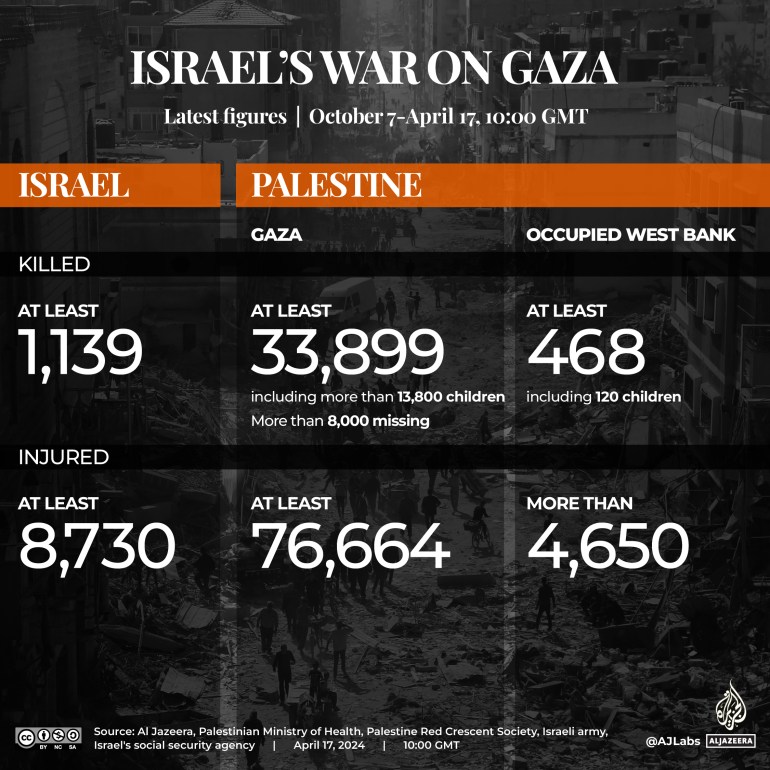Spain is on a mission.
As Israel’s war on Gaza rages on for a seventh month, with almost 34,000 Palestinians killed, Madrid wants to recognise Palestine as a state by July and is encouraging its neighbours to follow in its footsteps.
Prime Minister Pedro Sanchez, a longtime supporter of Palestinian rights, sees recognition as a way of reaching a two-state solution and a possible key to ending the devastating conflict that began in October.
“The time has come for the international community to once and for all recognise the State of Palestine,” he said in November. “It is something that many EU countries believe we have to do jointly, but if this is not the case, Spain will adopt its own decision.”
In all, 139 out of 193 United Nations member states consider Palestine as a state. Those which do include European nations such as Iceland, Poland and Romania, as well as countries like Russia, China and Nigeria.
The European Union as a whole does not recognise Palestine, nor do states including the United States, France and the United Kingdom.
Sanchez, who has discussed the issue on his recent trips abroad, has declared that his country has agreed with Ireland, Malta, and Slovenia on the need for recognition.
That four European governments are in favour of the move while others are against is a sign that the EU, as an institution, is deeply divided.
Earlier this week, Portuguese premier Luis Montenegro told Sanchez that his government would “not go as far” as Spain without a joint European approach.
Members of the bloc have for months adopted divergent positions on Israel’s conduct in the besieged enclave and are also split, perhaps to a lesser degree, on the Russia-Ukraine war.
But it is not surprising to see Ireland, Malta, Slovenia, and Spain taking the lead among EU members on this front, given their long-held positions in support of Palestinian self-determination.
The four governments would have preferred to make the move within the EU framework, which would have given them far more leverage, but the pro-Israel positions of Austria, Germany, the Netherlands, and others would stand in the way.
To that end, policymakers in Dublin, Ljubljana, Madrid, and Valletta determined that their best possible course of action was to move ahead in this relatively small group of like-minded EU members.
It is possible that a few more European countries will join soon later and agree to recognise the State of Palestine, said experts.
“This decision might trigger a few more recognitions, but I do not expect an avalanche,” Marco Carnelos, former Italian ambassador to Iraq, told Al Jazeera. “Other EU member states will watch what the big members like Germany, France, and Italy will do.”
According to Carnelos, there are “no chances” of Germany or Italy under Prime Minister Giorgia Meloni agreeing to such a move.
As for France, “maybe”, he said.
Belgium, whose officials have been more critical of the war and called for economic sanctions on Israel, has said it will consider recognising Palestine.
“Belgium holds the rotating presidency of the EU this semester and this is most likely the reason why the Belgian government has not joined Spain, Ireland, Slovenia, and Malta in their push to recognise Palestine,” Marc Martorell Junyent, a Munich-based journalist, told Al Jazeera.
“Considering the critical position of the Belgian government about Israel’s war against Gaza, it is likely Belgium will join the other countries in their efforts after June, when it will no longer hold the rotating presidency,” he added.
Other EU members will likely watch closely to see whether the move has negative repercussions on ties with the US, Israel’s top ally, or Israel itself.
Nonetheless, beyond “some verbal reaction” from the pair, Carnelos does not expect any concrete actions, such as the downgrading of diplomatic relations or economic sanctions.
In November, Israel summoned Belgium and Spain’s ambassadors after the leaders of both nations denounced alleged war crimes in Gaza. Israeli Foreign Minister Eli Cohen went as far as accusing them of giving “support to terrorism” at that time.
“In the case of Spain, Israel withdrew her ambassador for some time. Something similar could happen if Spain, Ireland, Slovenia, and Malta push for Palestine’s recognition,” said Martorell.
In March, Foreign Minister Israel Katz warned the four countries against recognising Palestine, likening the plan to a “prize for terrorism”.
In a similar vein, Israeli Ambassador to Ireland Dana Erlich, asked: “Why reward terrorism?”
![]()
Israel’s latest military campaign in Gaza is by far its deadliest.
This stage of the Israel-Palestine conflict began after Hamas, the group which governs the enclave, attacked southern Israel on October 7, killing 1,139 people and taking more than 200 captive. Some of the captives have been released, others have died, and dozens remain held.
Israel has been bombarding Gaza with the stated aim of crushing Hamas, but with mostly women and children among the dead and much of the Strip reduced to rubble, that goal remains elusive.
In recent months, several global powers have called for Israeli restraint, including Washington.
Analysts said even if Palestine is increasingly formally recognised, the reality of Israel’s illegal occupation of Palestinian land will limit the effect of the move.
If European nations were to apply serious pressure on Israel, it could happen in one of two ways, said Matorell. The first would be by suspending the EU-Israel Association Agreement, which is the legal basis of the bloc’s trade ties with Israel. The second would be through halting arms sales to Israel.
Spain, never one of Israel’s key arms dealers, is the only EU member to have imposed an arms embargo.
The only two members of the bloc to have recently sold Israel significant levels of weaponry are Germany and Italy – Israel’s second and third top sources of weapons behind the US.
Martorell believes that Berlin and Rome will continue with their arms sales to Israel for the foreseeable future.
“The only way European states will change the Israeli calculus and behaviour on the Palestinian issues is through heavy sanctions, but probably no European state, except Ireland I believe, will be ready to pursue such a path. Germany will prevent any move in such direction, and in this case, the US reaction could be very strong,” Carnelos told Al Jazeera.
“Ultimately, EU member states do not shine for their political courage and their determination in defending the values they are so proud about and claim so obsessively. Or, to put it more precisely, they do on certain topics but not on others. It is called a double standard,” added the former Italian diplomat.
Read More: World News | Entertainment News | Celeb News
Aljazera








